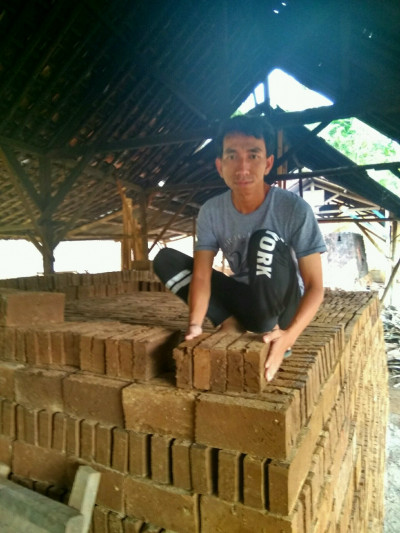
By Betsy Ramser Jaime
Wahyu Setiawan is an entrepreneur in the field of brick making for building materials. He has now maintained his business for 4 years. He learned the skill of brick making from his father and eventually was able to open his own brick factory.
He shares that, ‘since graduating from school I worked in an automotive company as an administrative staff, but I prefer to work outdoors so I have been learning how to produce bricks from my parents. My business initially experienced many obstacles such as failed production because of the inadequate composition of brick-making materials to the weather factor, but I have learned from those experiences and give me the spirit to try to correct the mistakes that happened and got better. Besides that I also want to earn my own income as an entrepreneur and as the head of the family should be able to meet the needs of my family because now I’m married.’
The area and land around his home is surrounded by hills which provides the perfect ingredients for brick making. In addition, there is currently a high demand for bricks in his city as new infrastructures and buildings are constructed. An additional advantage is that his business even allows him to play an important role in protecting the environment as his business is able to use the waste from other factories such as ash from plywood factory waste as raw materials in making the bricks.
One of the most significant ways that Zidisha entrepreneurs are able to help their own community members is by employing them to work in their businesses. And in fact, this is exactly what Wahyu is able to do. He notes that this is helpful because this way his community members are able to work locally rather than traveling long distances to bigger cities to find work.
Wahyu shares, ‘Until now I have 4 employees to help make bricks, on average I can produce 1500 – 2000 pcs of bricks per day and after going through the combustion process sold at a price of IDR 500 per piece, in 1 month I can sell 25000 – 35000 pcs of brick with a net profit of around IDR 7.500.000 per month, I am grateful because of this effort can meet the needs of the family, pay the salaries of employees and pay the Zidisha installment on time. With more demand for bricks it will require me to work harder to meet market demand and to provide more jobs. My full time employees work from Monday to Saturday each week and are off on weekends so they can take time out to rest and get together with their families. I want to create a comfortable working environment so they can work well.’
With his first 5 Zidisha funded loans between November and December 2017, he was able to buy basic brick making ingredients such as, ‘soil, sand, and firewood to burn the bricks.’ These loans allowed him to meet the ever increasing demand as new buildings went up in his city.
He then successfully raised 4 more loans beginning with a $58 loan in February 2018 through a $321 loan in April 2018. Each of these loans were similar in purpose as he continued to purchase more raw materials including: land, sand, and ash, with the remainder of the loan being used for daily operating expenses. During this time, he was also able to use a portion of his Zidisha funded loan to employ one other worker to keep up with the increasing demand. He was even able to re-pay his April loan faster than expected because of the influx of unexpected orders!
It’s clear that Zidisha and lenders have truly impacted the lives of Wahyu, his family, and community as he says, ‘An infinite thank you to Zidisha and the lenders who have funded my loan. I will use this loan as best I can on my brick business so that it grows well and can pay Zidisha’s installments on time. Thank you for your trust, your help is increasingly motivating me to continue to work better for the happiness of my family and our employees. God bless you all.’
Then, less than a month later, on May 1, 2018, Wahyu shared another update and also detailed part of the brick making process as he explained, ‘Greetings Zidisha and lenders, to continue my previous business update, the brick that has been cooked after the burning process is not a hot temperature anymore so it is ready to be dismantled and sent to each consumers. Bricks that are not ripe perfectly (blackish color) or that are still raw will be re-burned in the next combustion process so that it can mature normally again (reddish color), in this way then no bricks are thrown away.’
Would you like to help a hardworking entrepreneur like Wahyu? Make sure to head on over to our Lend page to read dozens of stories about similar business owners and the big changes that they are creating in their communities all over the world.









Wooow !! That’s awesome!!! .
I love this post and have really enjoy reading it over and over. Am inspired.